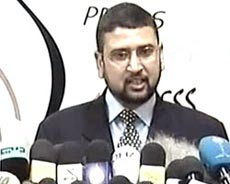|
Hamas Accuses West of Blackmail
 |
|
“This aid should not be linked to unfair conditions,” said Haniya. (Reuters).
|
GAZA
CITY, January 31, 2006 (IslamOnline.net & News Agencies) –
Rejecting demands from the Middle East peacemaking Quartet to
recognize Israel and “renounce violence” if it wants aid and
support, Hamas Tuesday, January 31, accused the West of blackmail.
“The
international aid which is offered to our people is a humanitarian
need for the Palestinian people who are still living under Israeli
occupation,” Ismail Haniya, who led the list of Hamas candidates in
last week's election, told Agence France-Presse (AFP).
“This
aid should not be linked to unfair conditions,” he added.
While
funding would continue for the time being, the quartet said in a
late-night statement Monday, “it was inevitable that future
assistance to any new government would be reviewed by donors against
that government's commitment to the principles of nonviolence,
recognition of Israel, and acceptance of previous agreements and
obligations.”
But
cracks were already showing Tuesday in the quartet's united resolve,
with Russian President Vladmir Putin saying the international
community must continue to provide aid to the Palestinians despite
Hamas' victory.
“Refusal
of aid to the Palestinian people would be a mistake in any event,”
Putin said at a news conference.
The
EU is the biggest donor to the Palestinian Authority, with aid of 500
million euros ($612 million) last year.
The
donor-dependent Palestinian Authority is already facing a financial
headache in trying to find the money to pay salaries for January, a
problem which Israel's decision to suspend customs revenues payments
will only exacerbate.
Two
hundred million shekels (40 million dollars) were due to be handed
over to the Palestinian Authority Wednesday, February 1, before acting
Prime Minister Ehud Olmert announced that he would not “in any way
to allow a situation in which money transferred by the government of
Israel will somehow end up in the control of murderous elements.”
Hamas
won a surprising 74 of the 132 seats in the Palestinian legislature,
against 45 for the ruling Fatah party.
The
group’s soaring popularity is attributed to its uphill struggle to
end the Israeli occupation, fighting corruption and for extensive
charity and social work.
Serving
Israel
 |
|
“The Quartet should have demanded an end to (Israeli) occupation and aggression,” said Zuhri.
|
Commenting
on the Quartet’s demands, Hamas MP Mushir Al-Masri said that they
served only Israel's interests.
“The
conditions posed by the quartet constitute pressure which serves the
interests of Israel and not the Palestinian people,” he told AFP.
“The
main problem is the (Israeli) occupation and not the democratic choice
made by the Palestinian people,” he said.
Masri
added that if the international aid continued to flow “the next
(Hamas) government will ensure that it is used according to the law
and not allow corruption.”
Hamas
Spokesman Sami Abu Zhuri, on his part, said the Quartet should have
demanded an end to (Israeli) occupation and aggression “not demanded
that the victim should recognize the occupation and stand handcuffed
in the face of the aggression.”
Meeting
in London, the diplomatic Quartet on Middle East peace -- which
includes the United Nations, the EU, Russia and the US -- pledged to
keep money flowing into Palestinian leader Mahmud Abbas' interim
caretaker administration.
“We
do believe that Abu Mazen needs to be supported,” said US Secretary
of State Condoleezza Rice, using Abbas' nom de guerre, ensuring that
funds will be available to pay for Palestinian police officers and
civil servants.
But
the Quartet warned that the Palestinians' critical lifeline of foreign
aid could be lost in the longer term unless Hamas “abandons
violence,” recognizes Israel and embraces the diplomatic
“road-map” to peace.
Hamas
leader Khaled Meshaal has played down American and European threats to
strip Palestinians of economic assistance.
“We
are not beggars and will not beg their aid,” he said defiantly.
“The
international community has the moral responsibility of aiding a
people under occupation; however, we will not beg for their money,”
Meshaal added.
Backfire
 |
|
“Should you be overly punitive, then obviously it will backfire,” Lasensky said.
|
American
analysts, meanwhile, warned that a “highly punitive” approach
against Hamas would backfire at the end of the day.
“The
challenge for the US and for other donors is not to make
conditionality look too heavy-handed and too negative," Scott
Lasensky, a Middle East expert for the Washington-based United States
Institute of Peace, told AFP.
“Should
you be overly punitive, then obviously it will backfire.”
Some
experts have suggested it was fruitless to expect Hamas give up its
cause overnight, and a more gradual process was needed to strike a
fruitful dialogue.
They
suggested setting a series of benchmarks for Hamas, such as
continuation of the truce with Israel and respect for a ban on the
public display of weapons, and rewarding it for compliance.
“Seeking
to engage with Hamas is not an attractive option, but it is the least
bad one,” said Jon Alterman, Middle East program director for the
Center for Strategic and International Studies (CSIS).
“The
key task for Israel, the United States, and their allies, is to shape
punishments and incentives that help guide Hamas in a desired
direction,” he said in a commentary posted Monday on the CSIS Web
site.
On
the other extreme, some analysts believe the only way to deal with
Hamas was to stick rigidly to demands that it acknowledges Israel's
right to exist and disarms, holding out inducements and punishments
accordingly.
“We
cannot afford to soften these conditions,” Dennis Ross, a former US
Middle East peace envoy, told a forum Monday at the Washington
Institute for Near East Policy.
|